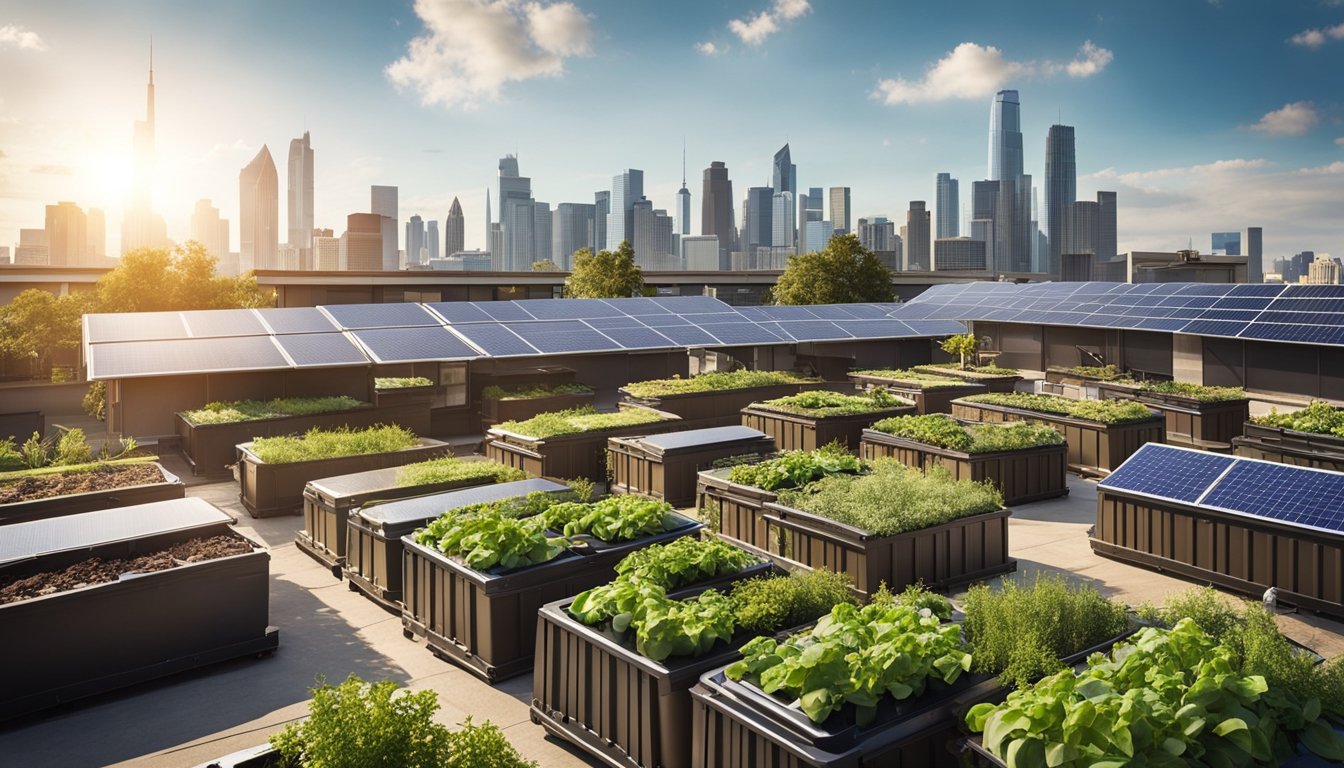Late updated: 06 Apr 2025 09:04
Written by: Sarah Hollister
Eco-Friendly Waste Management Ideas for Urban Areas: Innovative Solutions for Modern Cities
In the rapidly growing urban environments, effective waste management strategies are crucial for fostering sustainable urban development. Urban areas face unique challenges, but by adopting eco-friendly initiatives, we can transform these challenges into opportunities for progress. From composting techniques to innovative recycling practices, there are numerous ways to manage waste in a manner that benefits both the environment and the urban community.

As cities expand, it becomes ever more vital to promote sustainable waste solutions. By integrating technology and community participation, urban areas can reduce their environmental footprint. This approach not only conserves resources but also enhances the overall quality of life for residents.
Our cities have the potential to become models of sustainability through these innovative waste management ideas. By embracing these practices, we can contribute to creating healthier urban environments that support the needs of current and future generations.
Key Takeaways
- Eco-friendly waste management fosters sustainable urban development.
- Innovative strategies reduce the environmental footprint of urban areas.
- Technology and community involvement are key to successful waste solutions.
Foundations of Eco-Friendly Waste Management in Urban Settings
In urban environments, managing waste sustainably requires innovative approaches and strong policies. These encompass understanding the challenges of urban waste, the role of strategic policies and planning, and adherence to sustainable principles that focus on reducing carbon footprints and enhancing circular economies.
Understanding the Urban Waste Challenge
Urban areas face significant challenges in managing waste due to high population density and rapid urbanisation. The sheer volume of waste generated in cities necessitates efficient collection and disposal systems. We often see issues with inadequate infrastructure, leading to unsightly landfills that contribute heavily to the environmental impact. Food waste is particularly problematic, as it generates methane, a potent greenhouse gas. Thus, our focus should be on separation at source and boosting recycling. Education and awareness campaigns can help communities engage in waste reduction efforts, ensuring everyone is part of the solution.
Role of Environmental Policies and Urban Planning
Sound environmental policies and urban planning are essential in guiding cities towards sustainable waste management. Policies developed by bodies like the Environment Protection Agency (EPA) set standards for waste reduction and recycling. Urban planning must incorporate waste management facilities and policies into city designs. This includes establishing efficient recycling programmes and avoiding reliance on incineration. By integrating policies with urban planning, we can create cities that are not only efficient in waste management but also sustainable in the long run. Regulatory frameworks should incentivise businesses to reduce waste and adopt sustainable practices.
Principles of Sustainable Waste Management
Adopting a circular economy approach is a key principle in sustainable waste management. This involves designing products and processes that minimise waste and encourage reusability. We should prioritise actions like reducing packaging and promoting the use of reusable and recyclable materials. Raising public awareness and fostering behavioural change are crucial in making sustainability mainstream. Establishing city-wide universal collection systems can enhance material recovery, facilitating a shift from waste management to resource management. Sustainable practices not only conserve resources but also significantly reduce the carbon footprint, making urban areas healthier and more liveable.
Implementing Sustainable Waste Solutions

In our journey towards a sustainable city, numerous strategies can be employed to tackle waste. By focusing on innovative recycling programmes, encouraging composting, and expanding the circular economy, we can significantly reduce our waste footprint. Additionally, harnessing renewable resources and promoting a culture of reduction and reuse are critical steps.
Innovative Recycling and Composting Programmes
Developing robust recycling and composting programmes is fundamental in achieving a zero-waste future. Effective recycling systems involve proper waste segregation, ensuring materials like paper, plastics, and metals are repurposed efficiently. Introducing composting facilities for organic waste helps return valuable nutrients to the soil. Cities can establish community composting initiatives, allowing residents to collectively manage organic waste.
Implementing incentive-based recycling schemes, such as pay-as-you-throw models, can motivate residents to participate actively. Educational campaigns play a crucial role in raising awareness about proper waste segregation techniques. By integrating digital solutions, such as mobile apps that identify recyclable materials, we can enhance the effectiveness of these programmes.
Expanding the Circular Economy in Urban Spaces
To foster a circular economy, urban areas must rethink product lifecycles. This involves designing products with longevity and recyclability in mind. Encouraging businesses to adopt closed-loop systems allows resources to be reused, reducing the need for raw inputs. Shared economy models, like renting or leasing services, can minimise waste generation and support sustainable consumption patterns.
Urban planning plays a pivotal role. Cities can establish innovation hubs that focus on eco-design and resource recovery. By collaborating with local businesses and manufacturing sectors, we can create a resilient circular economy that champions waste reduction and promotes environmental responsibility.
Harnessing Renewable Resources and Energy Recovery
Utilising renewable resources and promoting energy recovery processes is vital for sustainable waste management. Advanced technologies enable the conversion of waste into renewable energy through methods like anaerobic digestion and waste-to-energy plants, effectively reducing landfill dependency.
Investing in renewable energy sources such as biomass and solar improves the energy footprint of urban areas. Initiating district heating systems powered by organic waste is another innovative approach. We should advocate for policies that support the integration of clean technologies, encouraging industries to adopt green practices that complement traditional waste management strategies.
Encouraging a Culture of Reduction and Reuse
Building a culture anchored on reduction and reuse requires community engagement and mindset shifts. Public campaigns can inspire individuals and businesses to minimise waste by choosing sustainable products and adopting minimal packaging. Encouraging reusable items, such as cloth bags and containers, can replace single-use plastics.
Schools and workplaces can introduce waste audits to identify reduction opportunities, empowering individuals to take action. Establishing community repair workshops fosters an environment where broken items are repaired and reused rather than discarded. By promoting a repair rather than replace mentality, we instil the values of sustainability into everyday life.
Frequently Asked Questions

In urban areas, effective waste management practices significantly reduce environmental impact and enhance living conditions. Exploring innovative strategies and principles, cities can address waste challenges while involving households and implementing best practices for sustainable handling.
How can urban areas adopt methods to improve waste management?
Urban areas can enhance waste management by implementing universal collection systems and promoting safe waste disposal. Emphasising the reduction and treatment of food waste can lead to significant improvements. Cities can encourage recycling efforts by providing proper facilities and educational programmes to increase community participation.
What are some innovative waste management strategies for modern cities?
Modern cities can embrace innovative strategies, such as promoting the use of cloth produce bags, investing in composting initiatives, and creating incentives for reducing single-use plastics. Smart waste collection systems and resource recovery facilities are also key strategies that can revolutionise waste management in urban environments.
What are the seven principles of waste reduction and how can they be implemented?
The seven principles of waste reduction include rethink, refuse, reduce, reuse, repair, recycle, and rot. Cities can implement these principles through public education campaigns and the establishment of community centres focused on repair and reuse. Introducing policies that encourage the reduction of packaging waste and promote recycling is essential.
In what ways can cities reduce solid and hazardous waste effectively?
Efficient reduction of solid and hazardous waste in cities involves avoiding the practice of incineration and focusing on safer disposal methods. Implementing stringent regulations for hazardous waste and ensuring proper containment and treatment facilities can minimise risks to public health and the environment.
What role do households play in reducing the waste footprint in urban communities?
Households are crucial in reducing the waste footprint by adopting sustainable practices such as composting food scraps and eliminating single-use plastics. Collective actions, such as participating in local recycling programmes and supporting bulk buying initiatives, help minimise waste production at the source.
What are some best practices for environmentally friendly handling of waste?
Adopting reusable containers and avoiding plastic bottles are some of the best practices for sustainable waste handling. Encouraging the composting of organic waste and integrating community recycling points can further contribute to environmentally friendly practices. Promoting the use of sustainable packaging materials also plays a vital role in handling waste responsibly.
